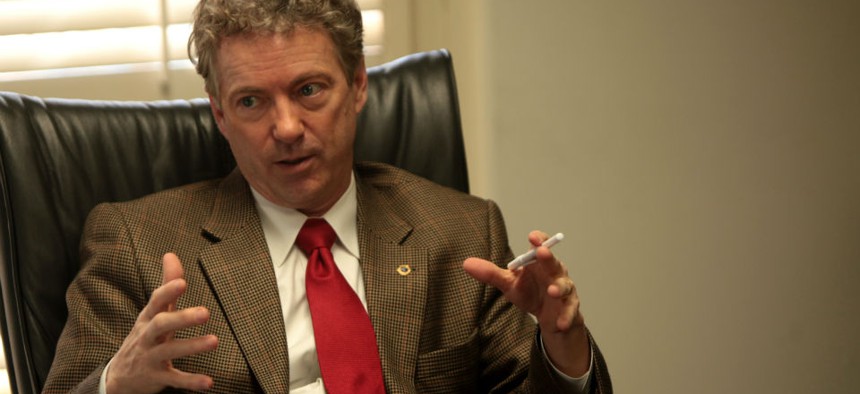
Sen. Rand Paul, R-Ky. Flickr user Gage Skidmore
Rand Paul Says Government Should 'Do No Harm'
In his State of the Union response, Paul also managed to get in a dig at Hillary Clinton.
In a response to President Obama's State of the Union address Tuesday night, Sen. Rand Paul called on the U.S. government to follow the instructions he received in medical school.
"As a physician, I was taught, 'First, do no harm,' to think before you act, to analyze the unintended consequences of your actions," Paul said. "I think Americans would be better off if all of our politicians took the same approach: First, do no harm."
Both in a video released on YouTube and in an interview with Fox News' Megyn Kelly, Paul pointed out that unemployment among African-Americans is twice that among whites. He also used the video as a platform to float bills and amendments he intends to introduce, including a constitutional amendment that would make balancing the budget mandatory.
Continue reading for a verbatim breakdown of Paul's proposals.
On term limits for members of Congress:
"The best thing that could happen is for us to once and for all limit the terms of all politicians. We already limit the president to two terms. I think we should put limits on the terms of Congress and infuse our government with fresh ideas."
On the Benghazi fallout:
"Hillary's war in Libya is a prime example of acting without thinking. Libya is now a jihadist wonderland. Jihadists swim in our embassy pool. Our ambassador is dead, and we are now more at risk for terrorist attacks than ever before."
On fighting terrorism:
"The Middle East lives in the midst of a thousand-year war between Sunni and Shia. Superimposed on the long war is a century-old war pitting a barbaric aberration of Islam against a civilized Islam. We are foolish to believe that we will solve this puzzle. We must defend ourselves and defend vital American interests, but we must not be deluded into believing that we can remake the Middle East in an image of Western democracy."
On race in America:
"Although I was born into the America that experiences and believes in opportunity, my trips to Ferguson, Detroit, Atlanta, and Chicago have revealed what I call an undercurrent of unease. There's a tension that has become visible in the protests in every American city. As Congressman John Lewis put it, 'There is growing discontent in this country.' I think peace will come when those of us who have enjoyed the American Dream become aware of those of us who are missing out on the American Dream. The future of our country will be secure when we break down the wall that separates us from the other America."
On health care:
"It is a noble aspiration and a moral obligation to make sure our fellow man is provided for, that medical treatment is made available to all. But compassion cannot be delivered in the form of coercion. President Obama's fundamental promise—that if you like your doctor you can keep them—was a lie. Obamacare at its core takes away a patient's right to choose. Under Obamacare, patients are prohibited from choosing their doctor or their insurance company. Today, more Americans may have medical insurance, but Americans are now paying more money for worse care."
On taxes:
"The president tonight calls for higher taxes. I believe we should do the opposite. I propose that we cut everyone's taxes, from the richest to the poorest, and we cut spending at the same time. Imagine a private stimulus fed by allowing you to keep more of your own money. Some will ask, 'But what of the safety net?' I say we will not cut one penny from the safety net until we have cut every penny from corporate welfare."
On spending:
"It has been several decades since Congress passed all of the spending bills individually. Instead, the spending bills are lumped together in something they call a CRomnibus that is thousands of pages long. They allow no amendments to cut wasteful spending. Often the bill is plopped on our desk with only a few hours to review. No one, and I mean no one, is able to read what's in the bill. To fix this, I will introduce legislation called Read the Bills Act. It mandates that Congress wait one day for each 20 pages of legislation."
On congressional exemptions:
"Congress should also live under the laws they pass. I will introduce a constitutional amendment that Congress shall pass no law that exempts Congress from the requirements of the bill. We have set up a privileged class in Washington, and Americans are sick and tired of it."
On surveillance programs:
"The Constitution is clear: Politicians should not collect this information without a warrant. Warrants must be specific to the individual, and there must be probable cause before a government is allowed to search any American's documents. The president created this vast dragnet by executive order without congressional authority. He should immediately end this invasion of our privacy."
On homeland security:
"I believe national defense is the single most important constitutional obligation of our federal government. We should have a military that is second to none in the world and ready to defend us from all enemies. To defend ourselves, we need a lean, mean fighting machine that doesn't waste money on a bloated civilian bureaucracy. The civilian bureaucracy at the Pentagon has doubled in the past 30 years, gobbling up the money necessary to modernize our defense. That's why I will propose the first-ever audit of the Pentagon and seek ways to make our Defense Department more modern and efficient without breaking the bank."
( Image via Flickr user Gage Skidmore )







